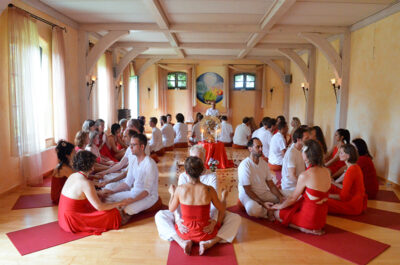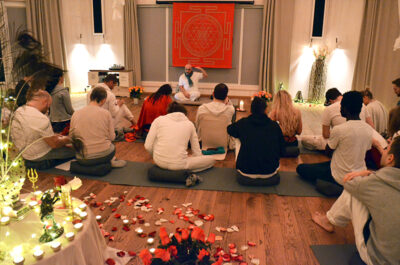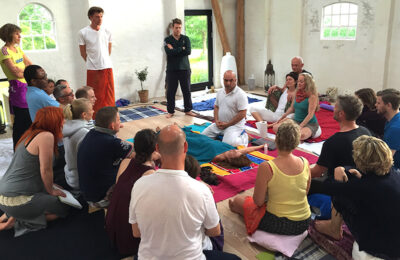Somananda
Founder and Head Teacher


Early life and education
Born in Israel, Somananda had an innate spiritual capacity as a young child and he developed a deep level of spiritual aspiration early on. He found himself praying, reading the Torah, and understanding high spiritual matters as a boy, despite that his family and upbringing were not religious.

In his youth Somananda became passionate about martial arts, studying full-contact Budokan and Shotokan Karate under elite master Ethan Bodagov. During his training, he earned the equivalent of a brown belt.
At the age of 18 Somananda joined the Israeli Army and fulfilled his three years of compulsory military service. Afterward, in an effort to appeal to his parents’ hopes and expectations, he enrolled in law school and in 1996 graduated from the College of Management Academic Studies in Rishon LeZion. He soon began working as a lawyer.
Starting his spiritual pursuits
However, Somananda’s spiritual interests had become increasingly intense during the years of his academic studies, and they could no longer be postponed. In 1996 his spiritual inquiry led him to lead an almost double life. By day he practiced law and by night he was engrossed in a personal Yoga practice from the lineage of Sivananda and read book after book of authentic yogic texts.

Three years later Somananda left for India where he discovered and studied under true yogic and tantric masters. The next 10 years were spent in retreat and intense sadhana in Southeast Asia, while developing himself as a serious spiritual practitioner and Yoga, Tantra, and meditation teacher.
Receiving his spiritual name
The bestowing of spiritual names has been part of many traditions for millennia. How does one get a spiritual name and why?
In monastic lineages, a preceptor or mentor grants a spiritual name at the time of ordination. However, in the authentic yogic lineages of India and Tibet, spiritual practitioners receive their new spiritual names directly from their gurus, who have themselves reached self-realization or enlightenment. Receiving such a name propagates a causal shift for the practitioner and affects his or her destiny. The timing for bestowing a spiritual name on a disciple is determined by the guru and often marks a direct acknowledgment for reaching a verified level of spiritual success. In some cases, practitioners may request a spiritual name to symbolize the break with their past mundane life and commitment to a new life dedicated to spiritual evolution.
Once a spiritual name is assumed, it serves as a second or even third birth, symbolically and spiritually. From that point onward disciples will notice a major transformation in various aspects of their lives, especially pertaining to their spiritual capacity and growth potential. This is why it is a sacred rite of passage coveted by many.
In 2009, Somananda was endowed with this godly favor by his guru. In Sanskrit the word soma means the ambrosia of rejuvenation and revitalization, while ananda represents the body of bliss. The meaning of the name Somananda is, therefore, reaching the body of bliss through the mysterious power of the soma.
Creation of the school
After his time in Southeast Asia, Somananda relocated to Europe and in 2009 Somananda Tantra School was born. His intent and vision was to create a pioneering spiritual university to meet the demands of spiritual seekers around the globe, sharing authentic and ancient knowledge from Tantra and Yoga.

Since its inception Somananda Tantra School has held over 300 spiritual courses and retreats in more than 25 countries worldwide (in Europe, Asia, North America, and South America), and has touched the lives of tens of thousands of students. The school now has an international team of teachers and project managers from Germany, Estonia, the United Kingdom, Slovenia, Hungary, Israel, and the United States.
Somananda has been sought after for media features and appearances, especially following a viral YouTube video demonstrating a full-body energy orgasm, which currently has over 14 million views.
Press, media & international speaking engagements
Books
- Somananda’s book, Tantra: Sex for the Soul, was published in 2014 in English. Since then it has been translated into Estonian, Czech, Bulgarian, and Slovenian.
International festivals
- Somananda was the founder of the International Tantra Festival, held in Estonia from 2013 to 2015. This was the largest dedicated Tantra festival in the world at the time, with more than 1,500 local and international attendees.
- Somananda has been a featured speaker at various European Yoga and Tantra festivals since 2014, including Yoga Festival Estonia, Malmö Tantra Festival, and Berlin Tantra Festival, among others.
Television & radio
- In 2016 Danish National TV (DR2) with Lasse Spang Olsen conducted measurable experiments with Somananda at the Technical University of Denmark and Aalborg University Hospital regarding his ability to move energy in another person with concentration of the mind and bring the person to a state of deep healing and even orgasm. The results were staggering and unexplainable by the observing professors. The machines registered a 40% increase in the activity of the parasympathetic nervous system, which could not be medically explained. Read the full overview here.
- Since 2009 Somananda has made multiple appearances on Estonian National TV, as well as commercial channels such as TV3, Kanal 2, and Tallinna TV.
- He has been interviewed for Estonian Radio, Viker Radio, and other stations.
- Somananda has made multiple appearances on Slovenian National TV, RTVSLO, and Radio Televizija Slovenija since 2016.
- His appearance on Hungarian national TV in 2015 featured an interview on Tantra Yoga and its benefits.
Print media
- Somananda has contributed many interviews and published articles to Estonian magazines and newspapers since 2010.
- He has been interviewed for many Slovenian magazine and newspaper publications since 2015.
- He was interviewed by the German magazine Auszeit in 2016.
YouTube
- Somananda produced a viral energy orgasm video which now has over 14 million views.
- Somananda Tantra School’s YouTube channel has more than 40,000 subscribers, 150 videos, and 20 million cumulative views.
- Somananda has created many vlogs discussing various spiritual topics such as Tantra, Yoga, and meditation (see here).




